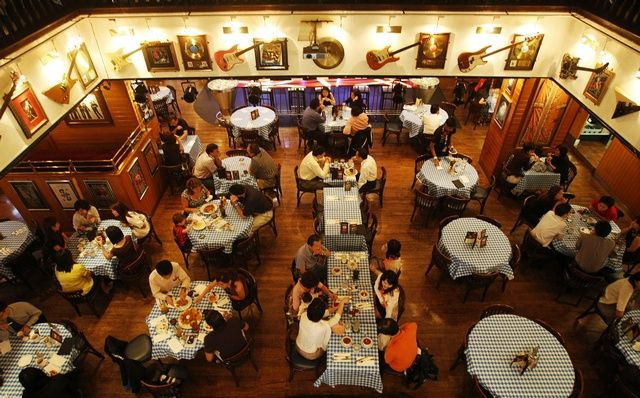No Crying Policy? Diners Applaud Old Fisherman’s Grotto, Rekindling Kid-Free Restaurant Debate

Call it throwing the baby out with the dishwater.
Amid reports on Wednesday that a Monterey, California, seafood restaurant has instituted a ban on strollers, high chairs and crying children, Internet users are descending upon the establishment’s Yelp and Facebook pages with a slew of visceral, impromptu reviews. But it’s not the outright hate fest you might expect. In fact, many restaurant goers are applauding the decision.
“Tasty food and no annoying kids? Excellent!” one Yelper beamed in a five-star review. “You will always have my business.”
Old Fisherman’s Grotto, a highly tracked tourist spot on Old Fisherman’s Wharf, gained national attention this week when a local news outlet discovered the policy posted on a large sign in front the restaurant. “Children crying or making loud noises are a distraction to other diners, and as such are not allowed in the dining room,” the sign said.
As news of the restaurant’s policy spread, social media reaction was swift -- as social media reaction tends to be -- but comments are largely divided between angry condemnation and glowing praise.
“Children are obnoxious and it’s great that there is an exclusive adult restaurant in town,” posted one Yelp user, echoing the much-repeated sentiment that adult diners should have the option of frequenting kid-free zones.
Even some parents applauded the decision. “Bravo on the noisy children policy!” wrote one Facebook user. “It really sucks to get a night out AWAY from the children, pay for a sitter and then sit down to a nice dinner only to hear other people’s children crying.”
Sounding off on Yelp after a business makes national news is an increasingly common tactic. Last month, the Seattle Gilbert & Sullivan Society came under fire for a production of “The Mikado” featuring a mostly white cast portraying Asian characters. Some theatergoers offended by the production took to the group’s Facebook page to express their thoughts with one-star reviews.
Old Fisherman’s Grotto is getting its share of angry comments as well. As of Thursday afternoon, 123 of the restaurant’s 1,811 Yelp reviews rated the business one star, with many of those having just been posted over the last 24 hours. The company’s total review count was even higher 24 hours ago, suggesting that some new reviews are either being flagged and deleted or filtered by Yelp’s algorithm. One reviewer accused the restaurant of discriminatory tactics. “You can’t discriminate against someone because of their age,” the Yelper wrote. “Shame on you.”
In response to the backlash, the restaurant’s owner, Chris Shake, has been defiantly unapologetic. “If a place has the rules, that’s what the rules are,” he told KSBW, a local NBC affiliate.
In fact, he may be right. No-child restaurant policies are nothing new, and they don’t appear to violate state or federal civil-rights laws, as the Wall Street Journal pointed out in 2011. The policies occasionally meet with controversy, like last year, when Pittsburgh Pirates first baseman Gaby Sanchez was turned away from a Pennsylvania restaurant when he showed up with his 10-month-old daughter. It turned out, the restaurant did not allow children under 6.
And it’s not the only one. In 2011, New York magazine’s Grub Street blog posted an interactive Google map of Big Apple eateries that have no-child policies. And if, after your meal, you want to kick back in a kid-free hotel, there are plenty of those too.
In the end, consensus speaks for itself: On Debate.org, some 93 percent of respondents agreed that restaurant owners should be allowed to implement child-free policies if they want to.
It’s OK to disagree, but please, no crying about it.
Got a news tip? Email me. Follow me on Twitter @christopherzara.
© Copyright IBTimes 2024. All rights reserved.






















